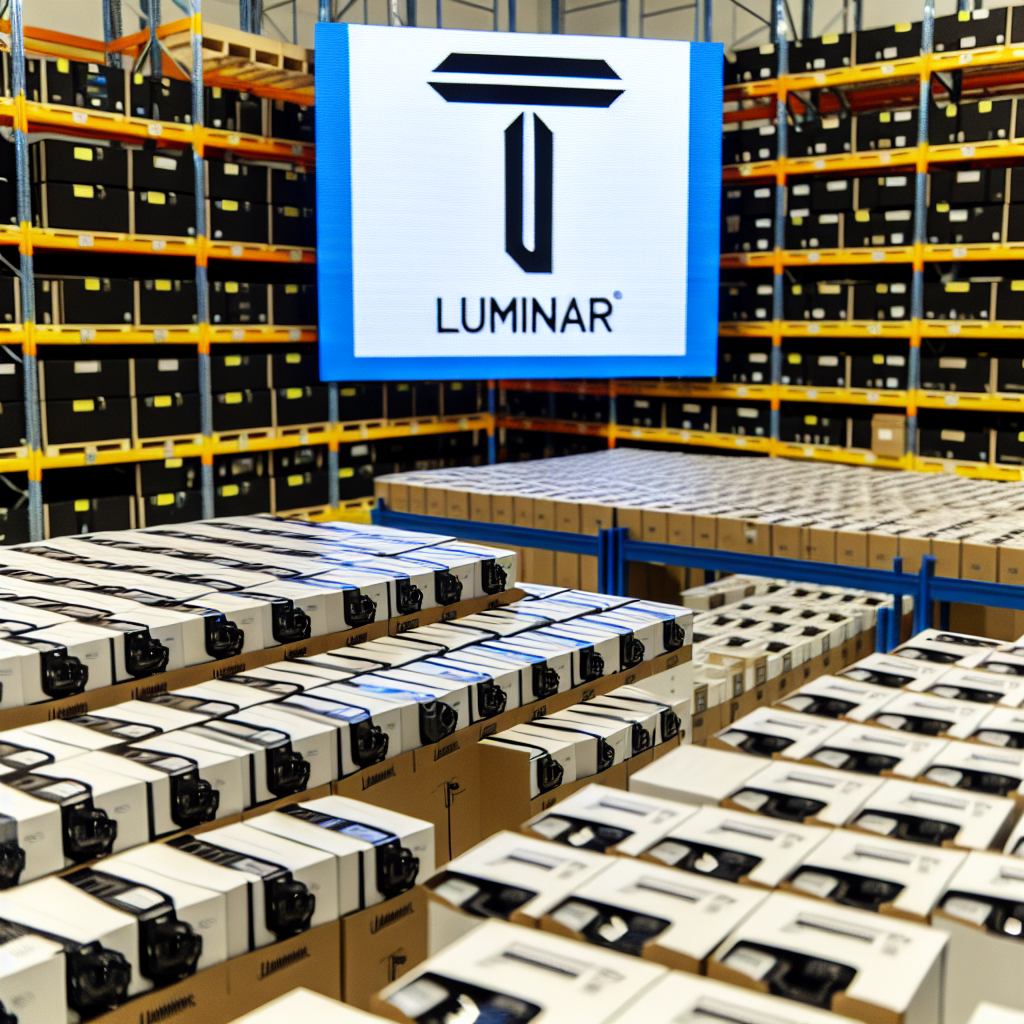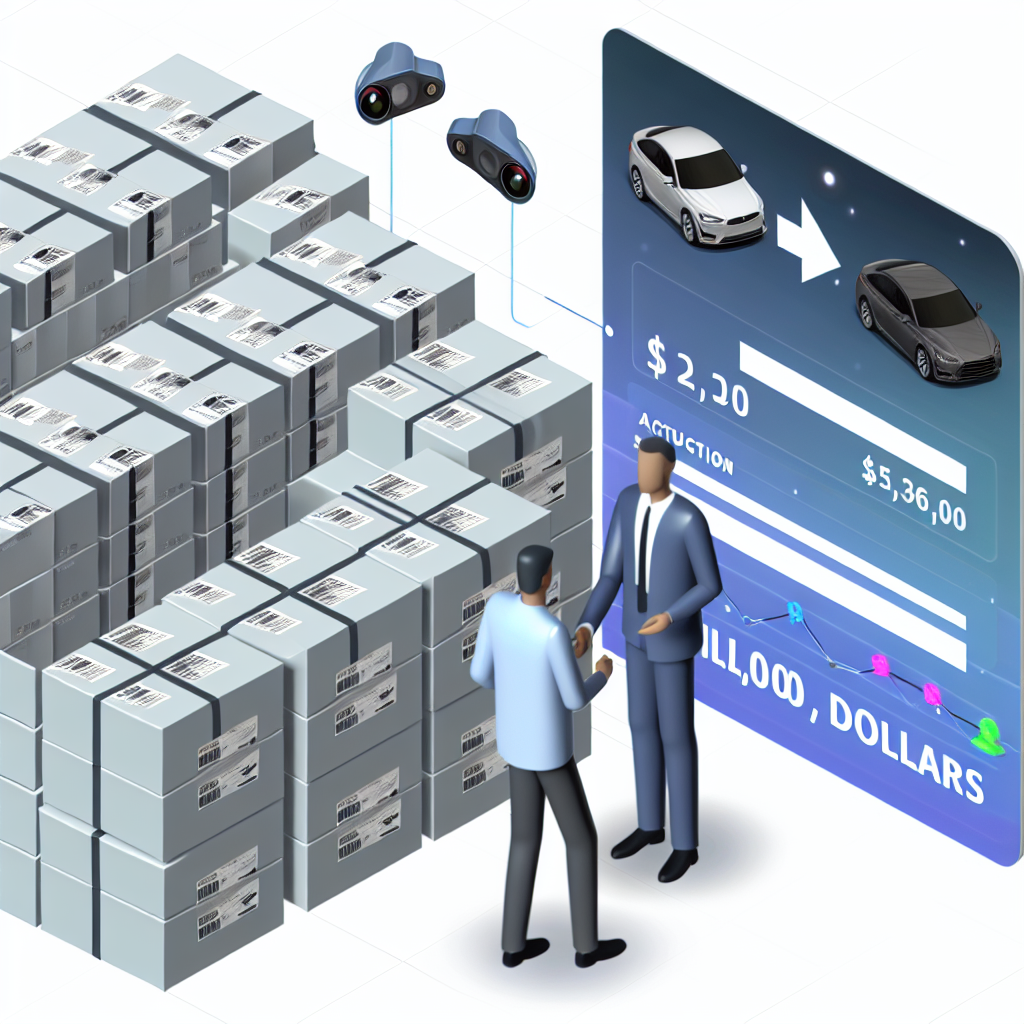Benefits of Lidar Sensors in Tesla’s Autonomous Driving Technology
Tesla, the renowned electric vehicle manufacturer, has recently made headlines with its purchase of over $2 million worth of lidar sensors from Luminar. This significant investment in lidar technology highlights the growing importance of this advanced sensing technology in Tesla’s autonomous driving technology. Lidar, which stands for Light Detection and Ranging, is a remote sensing method that uses laser light to measure distances and create detailed 3D maps of the surrounding environment. In this article, we will explore the benefits of lidar sensors in Tesla’s autonomous driving technology.
One of the key advantages of lidar sensors is their ability to provide highly accurate and detailed data about the surrounding environment. Unlike other sensing technologies such as cameras or radar, lidar sensors can generate precise 3D maps that capture the shape, size, and position of objects with remarkable accuracy. This level of detail is crucial for autonomous vehicles to navigate safely and make informed decisions on the road.
Furthermore, lidar sensors offer a wide field of view, allowing them to capture a comprehensive view of the surroundings. This panoramic view enables Tesla’s autonomous driving technology to detect and track objects in real-time, including vehicles, pedestrians, and cyclists. By continuously scanning the environment, lidar sensors provide a constant stream of data that helps the vehicle’s onboard computer system make accurate predictions and react swiftly to potential hazards.
Another significant benefit of lidar sensors is their ability to operate effectively in various weather conditions. Unlike cameras, which may struggle in low light or adverse weather conditions, lidar sensors rely on laser beams that are unaffected by external factors such as rain, fog, or darkness. This resilience ensures that Tesla’s autonomous vehicles can maintain a high level of performance and safety regardless of the weather conditions.
Moreover, lidar sensors play a crucial role in enhancing the overall safety of Tesla’s autonomous driving technology. By providing accurate and real-time data about the surrounding environment, lidar sensors enable the vehicle’s computer system to detect and respond to potential dangers more effectively. This includes identifying and avoiding obstacles, predicting the behavior of other road users, and executing precise maneuvers. With lidar sensors, Tesla’s autonomous vehicles can navigate complex traffic scenarios with greater confidence and reduce the risk of accidents.
In addition to safety, lidar sensors also contribute to the efficiency of Tesla’s autonomous driving technology. By accurately perceiving the environment, lidar sensors help optimize the vehicle’s path planning and decision-making processes. This optimization leads to smoother and more efficient driving, reducing energy consumption and enhancing the overall performance of Tesla’s electric vehicles.
Furthermore, lidar sensors enable Tesla’s autonomous vehicles to adapt to dynamic environments. With their ability to detect and track moving objects, lidar sensors provide crucial information for the vehicle’s computer system to anticipate and respond to changes in the surroundings. This adaptability is particularly important in urban environments, where traffic conditions can change rapidly, and the vehicle needs to make split-second decisions to ensure safety and efficiency.
In conclusion, Tesla’s purchase of lidar sensors from Luminar highlights the numerous benefits that this advanced sensing technology brings to the company’s autonomous driving technology. From providing highly accurate and detailed data to enhancing safety, efficiency, and adaptability, lidar sensors play a crucial role in enabling Tesla’s autonomous vehicles to navigate the roads with confidence. As lidar technology continues to advance, we can expect even greater integration and optimization of this technology in Tesla’s autonomous driving systems, further revolutionizing the future of transportation.
Tesla’s Partnership with Luminar: A Game-Changer in the Automotive Industry

Tesla’s Partnership with Luminar: A Game-Changer in the Automotive Industry
In a move that has sent shockwaves through the automotive industry, Tesla recently announced its partnership with Luminar, a leading provider of lidar sensors. Lidar, short for Light Detection and Ranging, is a technology that uses lasers to measure distances and create detailed 3D maps of the surrounding environment. This collaboration has the potential to revolutionize the way autonomous vehicles navigate and interact with their surroundings.
The significance of this partnership cannot be overstated. Lidar sensors are a crucial component in the development of self-driving cars, as they provide a high-resolution, real-time view of the vehicle’s surroundings. By using lasers to measure distances, lidar sensors can accurately detect and track objects, such as pedestrians, cyclists, and other vehicles, even in challenging weather conditions. This level of precision is essential for ensuring the safety and reliability of autonomous vehicles.
Tesla’s decision to partner with Luminar is a clear indication of their commitment to advancing autonomous driving technology. Luminar is widely regarded as a leader in the lidar industry, with their sensors being used by numerous companies in the autonomous vehicle space. By choosing to work with Luminar, Tesla is aligning itself with a company that has a proven track record of delivering high-quality lidar solutions.
The partnership between Tesla and Luminar is not just a win for the two companies involved; it has the potential to benefit the entire automotive industry. Lidar technology has long been seen as a critical piece of the puzzle in achieving fully autonomous driving. However, the high cost and limited availability of lidar sensors have been significant barriers to widespread adoption. Tesla’s decision to purchase over $2 million worth of lidar sensors from Luminar this year is a game-changer in this regard.
By committing to such a substantial purchase, Tesla is helping to drive down the cost of lidar sensors and increase their availability. This move will undoubtedly encourage other automakers to follow suit, accelerating the development and deployment of autonomous vehicles. As lidar sensors become more affordable and accessible, we can expect to see a rapid expansion of autonomous driving technology across the industry.
Furthermore, Tesla’s partnership with Luminar is likely to have a positive impact on the safety of autonomous vehicles. Lidar sensors provide a level of accuracy and reliability that is unmatched by other sensing technologies. By incorporating Luminar’s lidar sensors into their vehicles, Tesla is taking a significant step towards ensuring the safety of their autonomous driving systems.
In conclusion, Tesla’s partnership with Luminar represents a significant milestone in the development of autonomous driving technology. By purchasing over $2 million worth of lidar sensors from Luminar, Tesla is not only driving down the cost of this critical technology but also helping to improve its availability. This move has the potential to revolutionize the automotive industry, making autonomous driving a reality for millions of people around the world. With lidar sensors becoming more affordable and accessible, we can expect to see a rapid expansion of autonomous vehicles in the coming years. Tesla’s commitment to advancing autonomous driving technology is commendable, and their partnership with Luminar is undoubtedly a game-changer in the industry.
The Future of Lidar Technology: How Tesla’s Investment Impacts the Market
Tesla, the renowned electric vehicle manufacturer, has made a significant investment in lidar technology this year. The company has reportedly purchased over $2 million worth of lidar sensors from Luminar, a leading provider of advanced sensor and software solutions. This move by Tesla has sparked a lot of interest and speculation about the future of lidar technology and its impact on the market.
Lidar, which stands for Light Detection and Ranging, is a remote sensing technology that uses laser light to measure distances and create detailed 3D maps of the surrounding environment. It has become an essential component in autonomous driving systems, enabling vehicles to navigate and detect obstacles with a high level of accuracy. Lidar sensors emit laser beams and measure the time it takes for the light to bounce back after hitting an object, allowing them to create precise depth maps.
Tesla’s decision to invest in lidar technology is significant for several reasons. Firstly, it demonstrates the company’s commitment to advancing autonomous driving capabilities in its vehicles. Lidar sensors are considered a crucial component in achieving full autonomy, as they provide a detailed and real-time understanding of the vehicle’s surroundings. By integrating lidar sensors into its vehicles, Tesla aims to enhance the safety and reliability of its autonomous driving systems.
Secondly, Tesla’s investment in lidar technology has the potential to impact the market as a whole. The company’s decision to partner with Luminar, a leading lidar sensor manufacturer, could signal a shift in the industry. Luminar’s lidar sensors are known for their long-range capabilities and high resolution, making them ideal for autonomous driving applications. Tesla’s endorsement of Luminar’s technology could lead to increased adoption of lidar sensors in the automotive industry.
Furthermore, Tesla’s investment in lidar technology could also drive innovation and competition in the market. As one of the most influential players in the electric vehicle industry, Tesla’s endorsement of lidar technology could encourage other automakers to explore its potential benefits. This could lead to increased research and development efforts in the field, resulting in improved lidar sensors and more advanced autonomous driving systems.
However, it is worth noting that Tesla has been known for its skepticism towards lidar technology in the past. The company’s CEO, Elon Musk, has expressed his belief that lidar sensors are unnecessary for achieving full autonomy and that a combination of cameras and radar is sufficient. Tesla’s decision to invest in lidar technology could indicate a change in perspective or a recognition of the technology’s potential value.
In conclusion, Tesla’s investment in lidar technology has significant implications for the future of autonomous driving and the lidar market. By purchasing over $2 million worth of lidar sensors from Luminar, Tesla has demonstrated its commitment to advancing autonomous driving capabilities in its vehicles. This move could lead to increased adoption of lidar sensors in the automotive industry and drive innovation and competition in the market. While Tesla’s previous skepticism towards lidar technology is well-known, this investment suggests a potential shift in perspective. As lidar technology continues to evolve, it will be interesting to see how Tesla’s investment impacts the market and shapes the future of autonomous driving.


